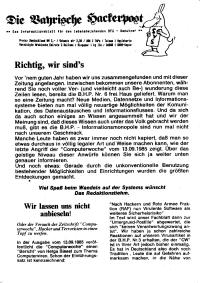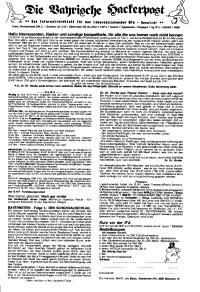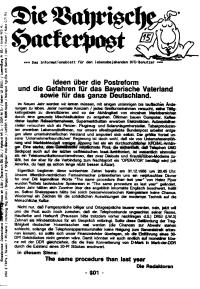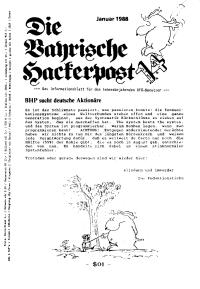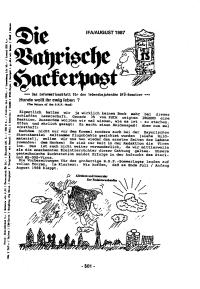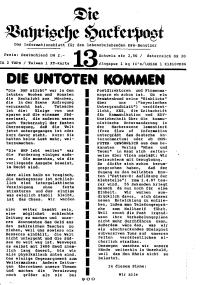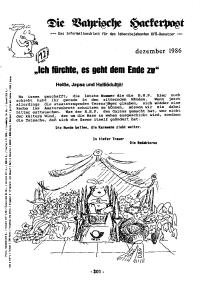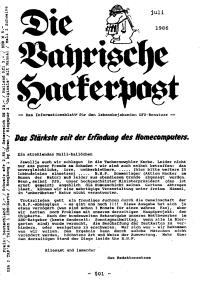Copy Link
Add to Bookmark
Report
HOMEBREW Digest #5487

HOMEBREW Digest #5487 Mon 19 January 2009
FORUM ON BEER, HOMEBREWING, AND RELATED ISSUES
Digest Janitor: pbabcock at hbd.org
***************************************************************
TODAY'S HOME BREW DIGEST BROUGHT TO YOU BY:
Sponsor The Home Brew Digest!
Visit http://www.hbd.org/sponsorhbd.shtml to learn how
Support those who support you! Visit our sponsor's site!
********** Also visit http://hbd.org/hbdsponsors.html *********
DONATE to the Home Brew Digest. Home Brew Digest, Inc. is a
501(c)3 not-for-profit organization under IRS rules (see the
FAQ at http://hbd.org for details of this status). Donations
can be made by check to Home Brew Digest mailed to:
HBD Server Fund
PO Box 871309
Canton Township, MI 48187-6309
or by paypal to address serverfund@hbd.org. DONATIONS of $250
or more will be provided with receipts. SPONSORSHIPS of any
amount are considered paid advertisement, and may be deductible
under IRS rules as a business expense. Please consult with your
tax professional, then see http://hbd.org for available
sponsorship opportunities.
***************************************************************
Contents:
RE: Belgian Candi Sugar (Josh Knarr)
A hard day's brew ("Jerry \"Beaver\" Pelt")
candi sugar (steve alexander)
* * * * * * * * * * * * * * * * * * * * * * * * * * * * *
* The HBD Logo Store is now open! *
* http://www.hbd.org/store.html *
* * * * * * * * * * * * * * * * * * * * * * * * * * * * *
* Beer is our obsession and we're late for therapy! *
* * * * * * * * * * * * * * * * * * * * * * * * * * * * *
Send articles for __publication_only__ to post@hbd.org
If your e-mail account is being deleted, please unsubscribe first!!
To SUBSCRIBE or UNSUBSCRIBE send an e-mail message with the word
"subscribe" or "unsubscribe" to request@hbd.org FROM THE E-MAIL
ACCOUNT YOU WISH TO HAVE SUBSCRIBED OR UNSUBSCRIBED!!!**
IF YOU HAVE SPAM-PROOFED your e-mail address, you cannot subscribe to
the digest as we cannot reach you. We will not correct your address
for the automation - that's your job.
HAVING TROUBLE posting, subscribing or unsusubscribing? See the HBD FAQ at
http://hbd.org.
LOOKING TO BUY OR SELL USED EQUIPMENT? Please do not post about it here. Go
instead to http://homebrewfleamarket.com and post a free ad there.
The HBD is a copyrighted document. The compilation is copyright
HBD.ORG. Individual postings are copyright by their authors. ASK
before reproducing and you'll rarely have trouble. Digest content
cannot be reproduced by any means for sale or profit.
More information is available by sending the word "info" to
req@hbd.org or read the HBD FAQ at http://hbd.org.
JANITORs on duty: Pat Babcock (pbabcock at hbd dot org), Jason Henning,
and Spencer Thomas
----------------------------------------------------------------------
Date: Mon, 19 Jan 2009 09:06:12 -0500
From: Josh Knarr <josh.knarr at gmail.com>
Subject: RE: Belgian Candi Sugar
I just had this same discussion over on beer advocate - what's
people's observations about the "cider" taste from table sugar?
Just for gits and shiggles, I brewed up a 1 gallon batch of the following:
* ENTIRELY TABLE SUGAR
* 50/50 Table Sugar, Muntons "Light" Dry Malt Extract
* 20/80 Table Sugar, Muntons "Light" Dry Malt Extract
This was to repeat the Great Belgian Experiment from homebrew radio.
Since the flavor threshhold was supposedly 20%, I figured I would make
one at 20% and see what happened. I also used a bread yeast, which
aggressively converts everything it can while being relatively neutral
in flavor. (This was "all purpose whole grain bread yeast" from
giant).
All of them (to me) came out cidery. The 100% sugar one was amazing,
it somehow came out to be the woodchuck dry cider flavor. It actually
wasn't bad at all chilled, but don't expect beer. I am ashamed to
admit I would probably make this again as a "hard cider" recipe for
parties, but using a better yeast. The 50/50 one was the worst of the
lot, it was beer-y, but then finished dry and cidery (but less so).
Tossing a lemon in there only remedied it a bit. I would not drink
this one again. The final one almost passed as Chimay's White. If I
had used hops (fuggles comes to mind), it MIGHT have covered up the
taste. Of all the "cidery" "beers", this was the least cidery but
still detectable without other factors like hops.
I think if I was brewing (now that I've ruined my palette tracking
down that taste) I would use any of the darker sugars various places
have for sale which are specficly for brewing, rather than risk it.
Also viable now is the DIY guide -
http://www.franklinbrew.org/brewinfo/candi_sugar.html - which looks
doable for any homebrewer. If you've read SACRED HERBAL AND HEALING
BEERS, also notice that a lot of the beers which call for sugar also
call for Lemon or Orange. It's my guess that medieval brewers were
doing the "sugar invert" before it really was understood.
- --
Katharine Hepburn - "Death will be a great relief. No more interviews."
------------------------------
Date: Mon, 19 Jan 2009 08:10:37 -0800 (PST)
From: "Jerry \"Beaver\" Pelt" <beaverplt at yahoo.com>
Subject: A hard day's brew
After a two year hiatus from brewing, (unemployment sucks)
I finally was able to get back in the game so to speak.
Got all the goodies to make a 6 gallon batch of pilsner
and set to work yesterday. Everything went fine and dandy
until the third temperature rest at 158 degrees when
I accidentally turned the stove down to low instead of off.
Considering the volume I believe I still achieved a complete
conversion. My iodine test was ok. I finished the mash,
lautered, and started the boil. While things were cooking
I grabbed my 6 gal carboy, cleaned it thoroughly, and
promptly dropped it in the sink shattering it into
lots of pieces. All I had to put the brew in then
is 5 gal carboys.
My question is this, knowing that most of you have
probably been through this same type of thing, will
my 5 gal batch be OK with 6 gal of ingredients?
My OG was right on target, so I think so, but
I'm just looking for a little confirmation.
(OK, and I wanted to whine)
------------------------------
Date: Mon, 19 Jan 2009 11:24:18 -0500
From: steve alexander <steve-alexander at roadrunner.com>
Subject: candi sugar
I'm no expert on Belgian beers or candi sugar but a few points ....
Most NA sugar is sucrose made from refined sugar cane. Our common
"brown sugar" is less refined and the brown coloration has the same
basic content as molasses (which is made from the residue of the cane
refining process). Molasses can have significant levels of iron which
can lead to a not-so-great flavor in beer and is one of the metal ions
we'd prefer to not introduce in beer. I can't say whether a brown
sugar addition can be harmful to beer flavor but it's generally not in
moderation.
For mostly political reasons the EU underwrite sugar beet farming in the
EU, tho' it is clearly cost-ineffective, so most "table sugar" in Europe
is sucrose from sugar beets. In my experience there is no discernible
flavor difference in a white sugar from beets or cane source when added
modately to a beverage or dish, but several sources note thet beet sugar
has a bitter aftertaste so it can't be used for certain purposes -
perhaps soft drinks - I don't recall at the moment. Perhaps it's a
matter of the degree of refining.
UK brewing texts also refer to "chip sugar" a sort of dark confectioners
sugar, which is/was made by acid hydrolysis of starch and has a high
content of glucose and a deep color (200-500EBC). These *were*
processed in the past by adding some nitrogenous compounds and
heating. This would cause not only caramelization but would also
produce Maillard products that would additionally add to the flavor and
color. Processing with nitrogen compounds is now frowned upon as
potentially carcinogenic in quantity. Hardly surprising that of the
thousands of Maillard products some are naughty. FWIW even caramel is
considered a potential mutagen. Anyway, anyone drinking beer is
probably taking much bigger health risks than from Maillard products and
caramel.
In the US, corn syrup is a form of hydrolyzed starch - mostly glucose,
but typically the hydrolysis is enzymatic these days and often vanilla
is added to the light colored stuff. Dark corn syrup is said to be
colored with molasses products leading in a dubious flavor direction.
It *seems* like caramelising pure corn syrup or a solution of corn sugar
or glucose to a dark color would approach the goal, but I can easily
imaging some scorching before you hit 200EBC in a home setup ... double
boilers come to mind ... toil & trouble too.
Apparently UK types and some Europeans & Aussies use a slightly
caramelized golden sucrose (Lyles the most famous) syrup on their
waffles. The Japanese use a hydrolysed clear syrup from rice or barley
starch to the same end. The Algonquin delicacy of maple syrup seems to
limited to parts of NA. Any attempt to insert maple syrup in beers
requires a light touch. I've had exactly one good example of an ale w/
maple syrup addition but it's very easy to over-do the maple flavor
impact and ruin the beer.
What I'd like to see is a dark caramelized glucose syrup w/o much
molasses or beet residue as an adjunct but aside from caramelizing it
myself I don't see an easy source.
Rather then emulate the Brits and Belgians with very dark sugar adjunct
perhaps the approach should be to get caramel and melanoidins from
malt and use light sugar to thin out the body & maltiness. Sounds more
practical to one who isn't a fundamentalist wrt brewing tradition.
-S
------------------------------
End of HOMEBREW Digest #5487, 01/19/09
*************************************
-------











